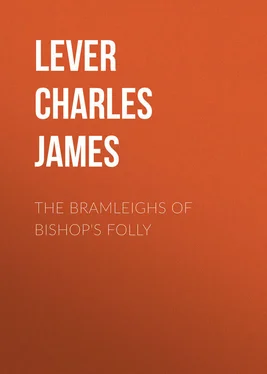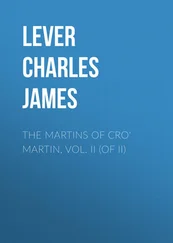Charles Lever - The Bramleighs of Bishop's Folly
Здесь есть возможность читать онлайн «Charles Lever - The Bramleighs of Bishop's Folly» — ознакомительный отрывок электронной книги совершенно бесплатно, а после прочтения отрывка купить полную версию. В некоторых случаях можно слушать аудио, скачать через торрент в формате fb2 и присутствует краткое содержание. Издательство: Иностранный паблик, Жанр: literature_19, foreign_antique, foreign_prose, на английском языке. Описание произведения, (предисловие) а так же отзывы посетителей доступны на портале библиотеки ЛибКат.
- Название:The Bramleighs of Bishop's Folly
- Автор:
- Издательство:Иностранный паблик
- Жанр:
- Год:неизвестен
- ISBN:нет данных
- Рейтинг книги:4 / 5. Голосов: 1
-
Избранное:Добавить в избранное
- Отзывы:
-
Ваша оценка:
- 80
- 1
- 2
- 3
- 4
- 5
The Bramleighs of Bishop's Folly: краткое содержание, описание и аннотация
Предлагаем к чтению аннотацию, описание, краткое содержание или предисловие (зависит от того, что написал сам автор книги «The Bramleighs of Bishop's Folly»). Если вы не нашли необходимую информацию о книге — напишите в комментариях, мы постараемся отыскать её.
The Bramleighs of Bishop's Folly — читать онлайн ознакомительный отрывок
Ниже представлен текст книги, разбитый по страницам. Система сохранения места последней прочитанной страницы, позволяет с удобством читать онлайн бесплатно книгу «The Bramleighs of Bishop's Folly», без необходимости каждый раз заново искать на чём Вы остановились. Поставьте закладку, и сможете в любой момент перейти на страницу, на которой закончили чтение.
Интервал:
Закладка:
“Here goes, then, for perfection,” cried Cutbill, gayly. “I ‘m ready from this time to believe anything you tell me.”
“Sir, I will not draw largely on the fund you so generously place at my disposal. I will simply ask you to believe me a man of honor.”
“Only that? No more than that?”
“No more, I pledge you my word.”
“My dear Bramleigh, your return for the income-tax is enough to prove that. Nothing short of high integrity ever possessed as good a fortune as yours.”
“You are speaking of my fortune, Mr. Cutbill, not of my character.”
“Ain’t they the same? Ain’t they one and the same? Show me your dividends, and I will show you your disposition – that’s as true as the Bible.”
“I will not follow you into this nice inquiry. I will simply return to where I started from, and repeat, I want to do something for Ireland.”
“Do it, in God’s name; and I hope you ‘ll like it when it ‘s done. I have known some half-dozen men in my time who had the same sort of ambition. One of them tried a cotton-mill on the Liffey, and they burned him down. Another went in for patent fuel, and they shot his steward. A third tried Galway marble, and they shot himself. But after all there ‘s more honor where there ‘s more danger, What, may I ask, is your little game for Ireland?”
“I begin to suspect that a better time for business, Mr. Cutbill, might be an hour after breakfast. Shall we adjourn till to-morrow morning?”
“I am completely at your orders. For my own part, I never felt clearer in my life than I do this minute. I ‘m ready to go into coal with you: from the time of sinking the shaft to riddling the slack, my little calculations are all made. I could address a board of managing directors here as I sit; and say, what for dividend, what for repairs, what for a reserved fund, and what for the small robberies.”
The unparalleled coolness of the man had now pushed Bramleigh’s patience to its last limit; but a latent fear of what such a fellow might be in his enmity, restrained him and compelled him to be cautious.
“What sum do you think the project will require, Mr. Cutbill?”
“I think about eighty thousand; but I’d say one hundred and fifty – it’s always more respectable. Small investments are seldom liked; and then the margin – the margin is broader.”
“Yes, certainly; the margin is much broader.”
“Fifty-pound shares, with a call of five every three months, will start us. The chief thing is to begin with a large hand.” Here he made a wide sweep of his arm.
“For coal like that yonder,” said Bramleigh, pointing to the specimen, “you ‘d not get ten shillings the ton.”
“Fifteen – fifteen. I’d make it the test of a man’s patriotism to use it. I ‘d get the Viceroy to burn it, and the Chief Secretary, and the Archbishop, and Father Cullen. I ‘d heat St. Patrick’s with it, and the national schools. There could be no disguise about it; like the native whiskey, it would be known by the smell of the smoke.”
“You have drawn up some sort of prospectus?”
“Some sort of prospectus! I think I have. There’s a document there on the table might go before the House of Commons this minute; and the short and the long of it is, Bramleigh” – here he crossed his arms on the table, and dropped his voice to a tone of great confidence – “it is a good thing – a right good thing. There ‘s coal there, of one kind or other, for five-and-twenty years, perhaps more. The real, I may say, the only difficulty of the whole scheme will be to keep old Culduff from running off with all the profits. As soon as the money comes rolling in, he ‘ll set off shelling it out; he ‘s just as wasteful as he was thirty years ago.”
“That will be impossible when a company is once regularly formed.”
“I know that, – I know that; but men of his stamp say, ‘We know nothing about trade. We have n’t been bred up to office-stools and big ledgers; and when we want money, we get it how we can.’”
“We can’t prevent him selling out or mortgaging his shares. You mean, in short, that he should not be on the direction?” added he.
“That’s it, – that’s exactly it,” said Cutbill, joyously.
“Will he like that? Will he submit to it?”
“He ‘ll like whatever promises to put him most speedily into funds; he’ll submit to whatever threatens to stop the supplies. Don’t you know these men better than I do, who pass lives of absenteeism from their country; how little they care how or whence money comes, provided they get it? They neither know, nor want to know, about good or bad seasons, whether harvests are fine, or trade profitable; their one question is, ‘Can you answer my draft at thirty-one days?’”
“Ah, yes; there is too much, far too much, of what you say in the world,” said Bramleigh, sighing.
“These are not the men who want to do something for Ireland,” said the other, quizzically.
“Sir, it may save us both some time and temper if I tell you I have never been ‘chaffed.’”
“That sounds to me like a man saying, I have never been out in the rain; but as it is so, there ‘s no more to be said.”
“Nothing, sir. Positively nothing on that head.”
“Nor indeed on any other. Men in my line of life could n’t get on without it. Chaff lubricates business just the way grease oils machinery. There would be too much friction in life without chaff, Bramleigh.”
“I look upon it as directly the opposite. I regard it as I would a pebble getting amongst the wheels, and causing jar and disturbance, sir.”
“Well, then,” said Cutbill, emptying the last drop into his glass, “I take it I need not go over all the details you will find in those papers. There are plans, and specifications, and estimates, and computations, showing what we mean to do, and how; and as I really could add nothing to the report, I suppose I may wish you a good night.”
“I am very sorry, Mr. Cutbill, if my inability to be jocular should deprive me of the pleasure of your society; but there are still many points on which I desire to be informed.”
“It’s all there. If you were to bray me in a mortar you could n’t get more out of me than you ‘ll find in those papers; and whether it ‘s the heat of the room, or the wine, or the subject, but I am awfully sleepy,” and he backed this assurance with a hearty yawn.
“Well, sir, I must submit to your dictation. I will try and master these details before I go to bed, and will take some favorable moment to-morrow to talk them over.”
“That’s said like a sensible man,” said Cutbill, clapping him familiarly on the shoulder, and steadying himself the while; for as he stood up to go, he found that the wine had been stronger than he suspected. “When we see a little more of each other,” said he, in the oracular tone of a man who had drunk too much; “when we see a little more of each other, we ‘ll get on famously. You know the world, and I know the world. You have had your dealings with men, and I have had my dealings with men, and we know what’s what. Ain’t I right, Bramleigh?”
“I have no doubt there is much truth in what you say.”
“Truth, truth, it’s true as gospel! There’s only one thing, however, to be settled between us. Each must make his little concession with reci-procity – reci-procity, ain’t it?”
“Quite so; but I don’t see your meaning.”
“Here it is, then, Bramleigh; here’s what I mean. If we ‘re to march together we must start fair. No man is to have more baggage than his neighbor. If I ‘m to give up chaff, do you see, you must give up humbug. If I ‘m not to have my bit of fun, old boy, you ‘re not to come over me about doing something for Ireland, that’s all,” and with this he lounged out, banging the door after him as he went.
Читать дальшеИнтервал:
Закладка:
Похожие книги на «The Bramleighs of Bishop's Folly»
Представляем Вашему вниманию похожие книги на «The Bramleighs of Bishop's Folly» списком для выбора. Мы отобрали схожую по названию и смыслу литературу в надежде предоставить читателям больше вариантов отыскать новые, интересные, ещё непрочитанные произведения.
Обсуждение, отзывы о книге «The Bramleighs of Bishop's Folly» и просто собственные мнения читателей. Оставьте ваши комментарии, напишите, что Вы думаете о произведении, его смысле или главных героях. Укажите что конкретно понравилось, а что нет, и почему Вы так считаете.












